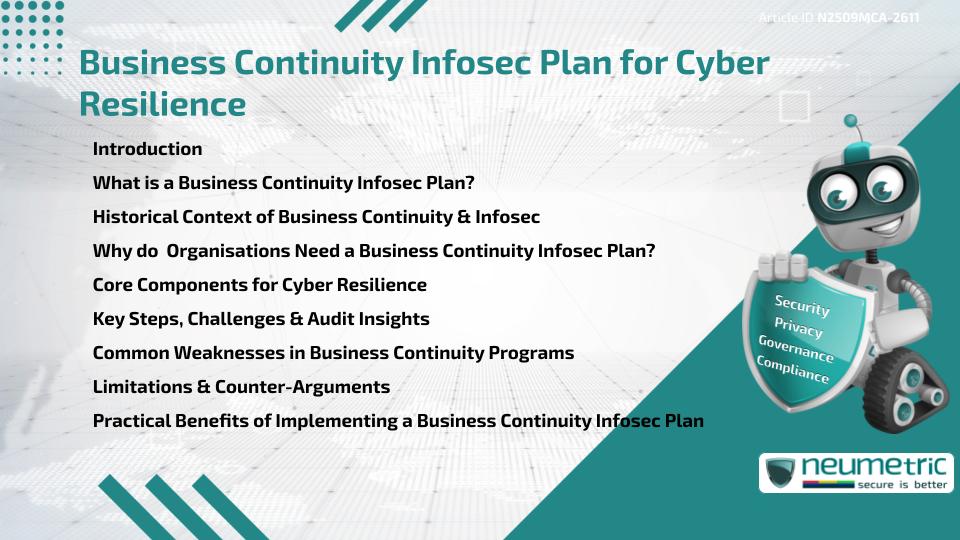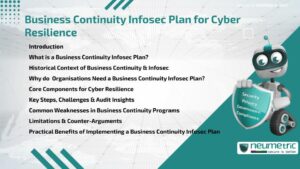Table of Contents
ToggleIntroduction
A Business Continuity Infosec Plan is a structured strategy designed to ensure an organisation can maintain Critical Operations during & after a Cyber Incident. It integrates Business Continuity with Information Security Measures to protect Systems & Data, minimise Downtime & reduce Financial & Reputational Risks. By combining Risk Management with Security Controls, this plan strengthens Cyber Resilience & supports long-term Trust.
What is a Business Continuity Infosec Plan?
A Business Continuity Infosec Plan combines two essential disciplines-Business Continuity & Information Security [Infosec]. It outlines the steps to recover from disruptions such as Ransomware attacks, System Outages or Data Breaches. The plan covers Policies, Technologies & Procedures to ensure that Sensitive Information & Critical Services remain secure & available even during unexpected Incidents.
Historical Context of Business Continuity & Infosec
Business Continuity emerged during the late 20th century as organisations sought to maintain operations during disasters. Meanwhile, Infosec developed to counter Cyber Threats & protect Sensitive Information. Over time, these two fields merged, recognising that Cybersecurity events could cause as much disruption as physical disasters. Today, a Business Continuity Infosec Plan is considered a cornerstone of modern resilience strategies.
Why do Organisations Need a Business Continuity Infosec Plan?
Organisations adopt a Business Continuity Infosec Plan to:
- Safeguard Customer Information & Intellectual Property
- Ensure Compliance with Regulatory Standards
- Minimise downtime during Cyber Incidents
- Strengthen Customer Trust & Client & Partner relationships
- Support Continuous Monitoring & Improvement
Without such a plan, even a minor Cyber Incident can cause significant disruptions, similar to how a vehicle without a spare tyre Risks being stranded after a puncture.
Core Components for Cyber Resilience
A strong Business Continuity Infosec Plan includes:
- Risk Assessment – Identify Assets, Risks & Vulnerabilities
- Incident Response Plan – Define steps to detect & respond to Security Incidents
- Disaster Recovery – Ensure quick restoration of Systems & Data
- Access Control – Limit exposure through effective Identity Management
- Training Program – Prepare Employees to handle Cyber Incidents
- Continuous Monitoring – Detect anomalies early & prevent escalation
Together, these components create a multi-layered defence system.
Key Steps, Challenges & Audit Insights
Implementing a Business Continuity Infosec Plan requires:
- Defining Scope & Critical Assets
- Conducting regular Risk Assessments
- Reviewing Policies, Technologies & Processes
- Testing the Incident Response & Disaster Recovery Procedures
- Performing Internal & External Audits
Challenges often include Resource Constraint, lack of Employee Training & aligning diverse Business Operations. However, Expert Consultation & Top Management support can significantly ease implementation.
Common Weaknesses in Business Continuity Programs
Audits often reveal weaknesses such as:
- Outdated Disaster Recovery measures
- Inadequate Incident Response Plans
- Insufficient Data Encryption & Access Controls
- Lack of Continuous Training for Employees
- Gaps in Continuous Monitoring & Improvement
These weaknesses underscore the need for a proactive approach.
Limitations & Counter-Arguments
Critics argue that developing a Business Continuity Infosec Plan can be resource-intensive. Smaller organisations may struggle with the cost & time required. Yet, ignoring such a plan is like neglecting home insurance-savings may appear in the short term, but the Risks are far more costly when incidents occur.
Practical Benefits of Implementing a Business Continuity Infosec Plan
Implementing a Business Continuity Infosec Plan offers significant advantages:
- Ensures Cyber Resilience during incidents
- Strengthens Compliance with Regulatory Standards
- Enhances Customer Trust & Client & Partner confidence
- Reduces the Financial impact of disruptions
- Builds a culture of Accountability & Preparedness
Ultimately, it ensures that organisations can maintain essential functions while protecting Sensitive Information.
Takeaways
- A Business Continuity Infosec Plan integrates Security & Continuity for resilience
- It protects Systems & Data against Cyber Incidents & downtime
- Key components include Risk Assessment, Incident Response & Disaster Recovery
- Despite costs, it prevents larger losses by ensuring preparedness
- Strengthens Customer Trust, Compliance & Operational stability
FAQ
What is the purpose of a Business Continuity Infosec Plan?
It ensures that an organisation can continue Critical Operations during & after Cyber Incidents.
How does a Business Continuity Infosec Plan improve Cyber Resilience?
It integrates Security Controls with continuity strategies to minimise downtime & data loss.
Who should be responsible for a Business Continuity Infosec Plan?
Top Management, IT teams, Legal & IT Experts & Business Continuity officers.
How often should a Business Continuity Infosec Plan be tested?
It should be tested at least annually or after major changes to Systems & Data.
What are common weaknesses found in Business Continuity Infosec Plans?
Weak Incident Response Plans, outdated Disaster Recovery measures & lack of Continuous Training.
Is a Business Continuity Infosec Plan mandatory?
Not always, but it is highly recommended to meet Compliance Requirements & strengthen Resilience.
Need help for Security, Privacy, Governance & VAPT?
Neumetric provides organisations the necessary help to achieve their Cybersecurity, Compliance, Governance, Privacy, Certifications & Pentesting needs.
Organisations & Businesses, specifically those which provide SaaS & AI Solutions in the Fintech, BFSI & other regulated sectors, usually need a Cybersecurity Partner for meeting & maintaining the ongoing Security & Privacy needs & requirements of their Enterprise Clients & Privacy conscious Customers.
SOC 2, ISO 27001, ISO 42001, NIST, HIPAA, HECVAT, EU GDPR are some of the Frameworks that are served by Fusion – a SaaS, multimodular, multitenant, centralised, automated, Cybersecurity & Compliance Management system.
Neumetric also provides Expert Services for technical security which covers VAPT for Web Applications, APIs, iOS & Android Mobile Apps, Security Testing for AWS & other Cloud Environments & Cloud Infrastructure & other similar scopes.
Reach out to us by Email or filling out the Contact Form…





